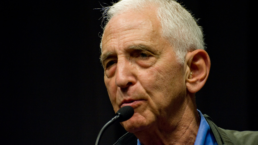A paltry number of representatives and senators in the U.S. Congress have shown interest in the Justice Department’s unprecedented prosecution of Assange. Fewer have raised their voice to oppose the political case against him.
By Greg Mitchell, Oppenheimer and the Legacy of His Bomb
News emerged yesterday, via the Hollywood Reporter, that a feature-length doc based on a book by my late friend Daniel Ellsberg is making progress, now with help from actress Kristin Stewart. The film, titled How to Stop a Nuclear War and based on Dan’s book Doomsday Machine: Confessions of a Nuclear War Planner (see my take below), was announced one year ago but still seeking backers via a new “sizzle reel.” Emma Thompson will narrate and Paul Jay directs.

Stewart says in the new promo: “We’ve grown so accustomed to the looming threat of nuclear annihilation, that it barely registers in our daily lives. But when some new crisis or close call startles out of our slumber for just a brief moment, we truly grasp the insanity of living on a hair trigger to what could be a real-life Armageddon.”
Stewart’s fiancée, Dylan Meyer, is the daughter of Nicholas Meyer, the director of ABC’s groundbreaking 1983 TV movie The Day After and an executive producer of the How to Stop a Nuclear War documentary….Stewart, who will also appear in the eventual documentary, echoes Ellsberg in arguing the world is “dangerously close to nuclear conflict, perhaps closer than we have been since the Cold War.”
In the sizzle reel sent to potential investors of the doc as the producers fill out the budget, Stewart praises the history-making whistleblower, who died in June 2023 at age 92. “[Ellsberg’s] insider knowledge of nuclear war planning informs the film’s urgent call to action. This films sounds the alarm about this threat, but also shows the solutions and steps we can take to avert catastrophe,” she adds.
Ellsberg famously made copies of the Pentagon Papers and other classified nuclear documents during the Nixon administration and leaked the documents to The New York Times and other media outlets in 1971. As a high-level Pentagon analyst, Ellsberg was charged by the U.S. with breaking the Espionage Act, but the case was dismissed because of government misconduct in evidence-gathering.
“If we don’t address this [nuclear weapons] issue, nothing else we care about — no social justice or environmental causes or peaceful political resolutions, movies we make, people we love, the things we care about — don’t matter anymore. They don’t matter in a postapocalyptic wasteland,” Stewart warns.
Recent Posts
Talk World Radio: India Walton On Zohran Mamdani And Freezing Out ICE
July 7, 2025
Take Action Now India Walton, former Democrat nominee for mayor of Buffalo, NY, discusses Zohran Mamdani and the race for NYC mayor and how to deal…
How Climate Change Is Worsening Flooding And Heavy Rainfall
July 7, 2025
Take Action Now The latest science on the link between climate change and natural disasters — and how they may be playing out where you live.By…
In Netanyahu’s Visit, Genocide Made Invisible
July 7, 2025
Take Action Now The U.S.’s embrace of Benjamin Netanyahu on this visit amounts to a full endorsement of his genocidal policies.By Norman…
Israel Continues To Starve, Target Gaza Civilians In Ongoing Genocide
July 6, 2025
Take Action Now Israeli commanders continue deliberately to starve the civilian population, continuing in some form a blockade on staples they began…




